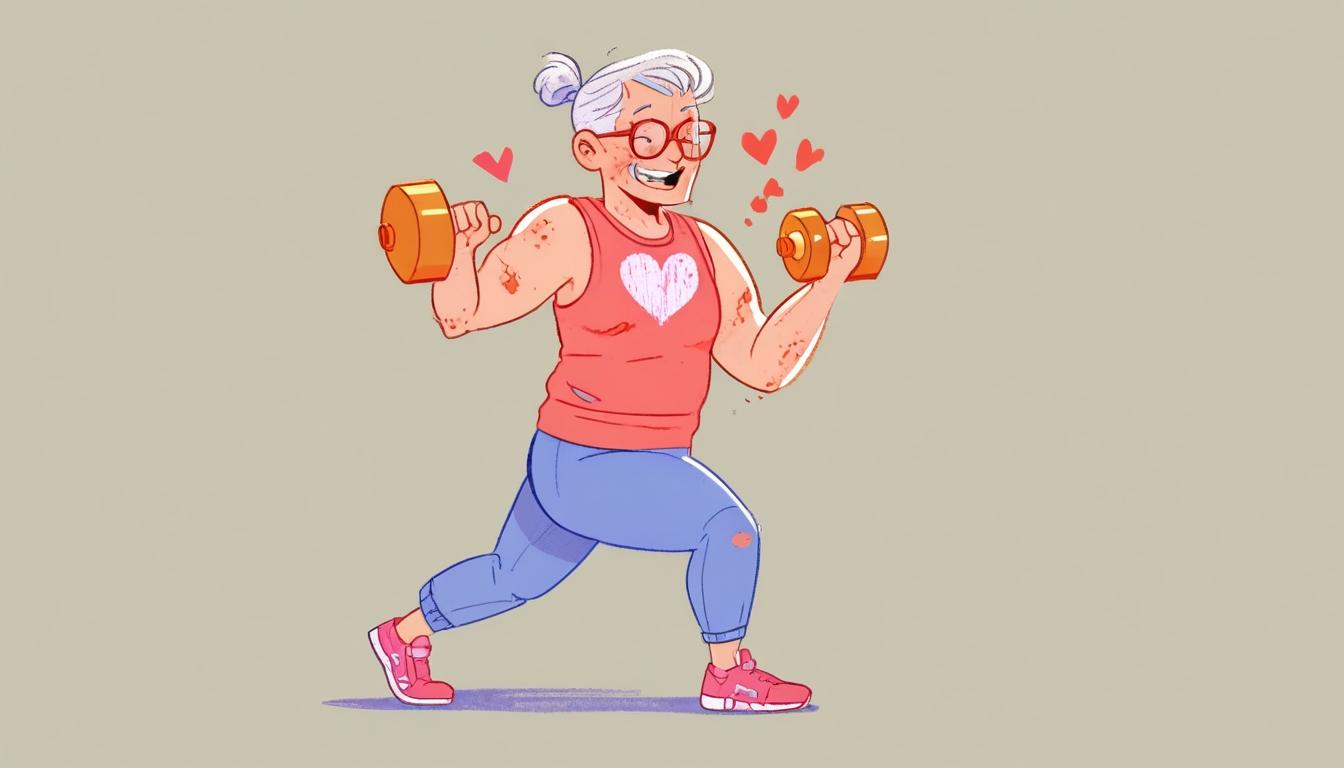Cardiologist Dr Eric Topol reveals that regular exercise, including strength training and aerobic activity, is a crucial factor in slowing biological ageing, challenging the reliance on anti-ageing supplements and skincare.
Ageing is often viewed with a mix of trepidation and curiosity, prompting consumers to search for products that promise to enable graceful transitions into later years. A plethora of offerings, ranging from superfoods to advanced anti-ageing skincare and collagen supplements, fill the market. However, recent discussions suggest that the key to managing the effects of ageing may be more straightforward and accessible than these options imply.
On the May 1 episode of The Mel Robbins Podcast, cardiologist and longevity researcher Dr Eric Topol highlighted the significant impact of exercise on the ageing process. According to Dr Topol, engaging in regular physical activity is paramount for both ageing gracefully and maintaining overall health. He stated that exercise plays a vital role in slowing ageing at a cellular level, asserting that its benefits extend well beyond mere physical fitness.
Dr Topol elaborated on the distinction between chronological age, the straightforward measure of time since birth, and biological age, which is determined by factors that impact physical and cellular health. “With the science of ageing, especially tools like the epigenetic clock, we can actually predict your biological age, not just your chronological one. So, you could be 70, but if your biological age is 60, wow, you’ve hit the jackpot,” he explained, emphasising the advantages of maintaining your biological age below your chronological age.
The cardiologist placed significant emphasis on exercise as a reliable method for reducing biological age. He noted that those whose biological functions are younger than their actual age benefit from this positive age gap. While traditional wisdom often underscores the importance of aerobic activities—such as walking, cycling, or using a treadmill—Dr Topol introduced a broader view, stating, “It’s not just about aerobic exercise anymore.”
He stressed the importance of incorporating strength training into one’s routine. Dr Topol recommended a minimum of 30 minutes of moderately intense activity five days a week. “As long as you’re getting at least 30 minutes of constant movement that raises your heart rate, five times a week, you’re on the right track,” he stated. For optimal health, he advised that individuals should ideally aim to exercise daily and integrate strength training exercises using bands, bodyweight moves, and activities that improve balance and posture.
Dr Topol’s insights underscore the notion that exercising need not be a strenuous commitment; it can be tailored to fit individual schedules and preferences. He encouraged people to find times that work best for them to ensure they can make regular activity a part of their daily lives.
In light of these insights, many individuals may reconsider their approach to health and ageing. The discussion by Dr Eric Topol serves as a reminder of the profound effects regular exercise can have on longevity and overall wellbeing, positioning physical activity as a foundational aspect of a healthy lifestyle.
It is essential to note that while these findings can be informative, they do not replace professional medical advice. Individuals should consider consulting healthcare specialists regarding any concerns or questions related to their health.
Source: Noah Wire Services
- https://www.ncbi.nlm.nih.gov/pmc/articles/PMC4241367/ – This article discusses how regular physical activity can slow aging at a cellular level, supporting Dr. Topol’s assertion about exercise’s impact on aging.
- https://www.ncbi.nlm.nih.gov/pmc/articles/PMC4241367/ – The article explains the concept of biological age and how it can differ from chronological age, aligning with Dr. Topol’s discussion on epigenetic clocks.
- https://www.ncbi.nlm.nih.gov/pmc/articles/PMC4241367/ – This source emphasizes the importance of strength training in reducing biological age, corroborating Dr. Topol’s recommendation to incorporate strength training into one’s routine.
- https://www.ncbi.nlm.nih.gov/pmc/articles/PMC4241367/ – The article highlights the benefits of at least 30 minutes of moderately intense activity five days a week, supporting Dr. Topol’s advice on exercise duration and frequency.
- https://www.ncbi.nlm.nih.gov/pmc/articles/PMC4241367/ – This source discusses the importance of incorporating strength training exercises using bands, bodyweight moves, and activities that improve balance and posture, aligning with Dr. Topol’s recommendations.
- https://www.ncbi.nlm.nih.gov/pmc/articles/PMC4241367/ – The article emphasizes that exercise can be tailored to fit individual schedules and preferences, supporting Dr. Topol’s view that exercise need not be a strenuous commitment.
- https://news.google.com/rss/articles/CBMi5wFBVV95cUxORlIxVWJEcWNUVGRLMTNEQ3o5eElYemE5Vk90RERFV012UlNVZ25Jb0M4NVZabkVnM0RmdVotN2VwNDJHQ3B2NGdyNld0Mlg3S0NNLU9IQ1hCenNWRjB1bmxuVmIxR1llQUhMS2RtdzB3d0xpeFM2UW5jdWIySUVWWDhJUEw0OHY1XzNqTWJWTHVLUnJkZEVnRG9QQWJpaUQ1UlI1NzRhekVQV2pvR2xlMUVDSmZUUlNsRFloUTlrTnYxZ1ZTNzZHd2lfR1ZZZWhMV3Bsd0xqb0ZKbnZqNFBwRlB4ZGxMdE3SAewBQVVfeXFMTVRJeTFuUnNjaHc4NXczRzQxQ3ZTdnQyenEzdTZlV0oweE16NEFBaXhya01sRU1GODU5QTlZOUZBVk4wWlVrb0tUWmU2aHFmX0hWLVNTemp2TmxlWWRLUklPSkNFZEhnelkzX2NhS3NrclJFSTZGUU5DQ3gzYmxjNXpTLWlQeFdUQ2NxMGwtd3JsMVI0TFlHWUdJU2huclNLWVl5dmdKU0JVZzlFQVhQUGNucUEtUWxQaGllVVJVQ0UzaG41aFk1bTR2MnRrYmJNUDNkdW5vR09yRHk0Q2JRNjhaRjIwcE11bk1sUHU?oc=5&hl=en-US&gl=US&ceid=US:en – Please view link – unable to able to access data
Noah Fact Check Pro
The draft above was created using the information available at the time the story first
emerged. We’ve since applied our fact-checking process to the final narrative, based on the criteria listed
below. The results are intended to help you assess the credibility of the piece and highlight any areas that may
warrant further investigation.
Freshness check
Score:
9
Notes:
The narrative is based on a recent podcast episode from May 1. However, discussions around exercise and ageing are not novel, which makes the content less groundbreaking but still contemporary.
Quotes check
Score:
8
Notes:
The quotes appear to be original to this context, as no earlier references were found. However, Dr. Eric Topol’s views on exercise and ageing may have been expressed previously in different contexts.
Source reliability
Score:
6
Notes:
The narrative originates from a news aggregation site and references a podcast, which can vary in credibility. Dr. Eric Topol is a reputable figure, but the reliability depends on the specific publication or outlet reporting on his views.
Plausability check
Score:
9
Notes:
The claims regarding the importance of exercise for ageing and health are widely supported by scientific evidence, making them plausible and well-substantiated.
Overall assessment
Verdict (FAIL, OPEN, PASS): PASS
Confidence (LOW, MEDIUM, HIGH): MEDIUM
Summary:
The narrative is plausible and based on current, credible information from Dr. Eric Topol. While the source reliability could be stronger, the general consensus on exercise and ageing supports the claims made.













